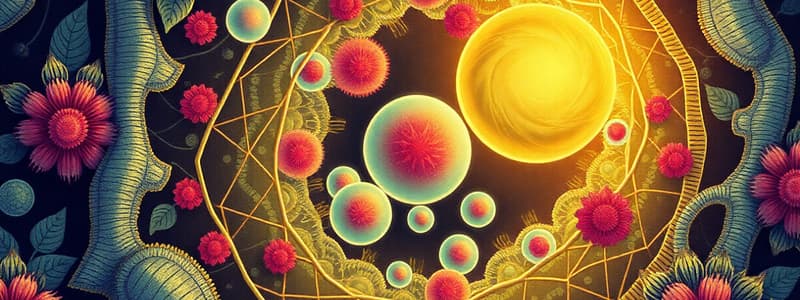Podcast
Questions and Answers
A researcher is studying a cell and observes that it is actively synthesizing proteins. Which organelle is most likely playing a primary role in this process?
A researcher is studying a cell and observes that it is actively synthesizing proteins. Which organelle is most likely playing a primary role in this process?
- Nucleus
- Vacuole
- Ribosome (correct)
- Mitochondrion
If a cell lacks chloroplasts, it would be unable to perform which of the following functions?
If a cell lacks chloroplasts, it would be unable to perform which of the following functions?
- Protein synthesis
- DNA replication
- Photosynthesis (correct)
- Cellular respiration
A scientist discovers a new single-celled organism. Upon examination, the cell lacks a nucleus. Which of the following structures would still be expected to be found in this cell?
A scientist discovers a new single-celled organism. Upon examination, the cell lacks a nucleus. Which of the following structures would still be expected to be found in this cell?
- Endoplasmic Reticulum
- Plasmids (correct)
- Mitochondria
- Golgi Apparatus
During intense exercise, muscle cells require a significant amount of energy. Which organelle would be most active in these cells to meet this energy demand?
During intense exercise, muscle cells require a significant amount of energy. Which organelle would be most active in these cells to meet this energy demand?
Cells in the pancreas are specialized to produce and secrete insulin. This is an example of what process?
Cells in the pancreas are specialized to produce and secrete insulin. This is an example of what process?
Why is diffusion sufficient for nutrient transport in single-celled organisms, but not in larger, multicellular organisms?
Why is diffusion sufficient for nutrient transport in single-celled organisms, but not in larger, multicellular organisms?
A plant cell is placed in a hypotonic solution. Which organelle plays the most significant role in maintaining turgor pressure and preventing the cell from bursting?
A plant cell is placed in a hypotonic solution. Which organelle plays the most significant role in maintaining turgor pressure and preventing the cell from bursting?
If a plant cell were to be plasmolyzed (lose water and shrink), which structure would primarily be responsible for maintaining the cell's shape after the loss of internal pressure?
If a plant cell were to be plasmolyzed (lose water and shrink), which structure would primarily be responsible for maintaining the cell's shape after the loss of internal pressure?
Flashcards
Nucleus Function
Nucleus Function
The control center of the cell; contains DNA and directs cell activities.
Chloroplasts
Chloroplasts
Organelles unique to plant cells that conduct photosynthesis.
Plasmids
Plasmids
Small, circular DNA molecules separate from chromosomal DNA; often carry genes for antibiotic resistance.
Mitochondria
Mitochondria
Signup and view all the flashcards
Cell Differentiation
Cell Differentiation
Signup and view all the flashcards
Diffusion in Single-Celled Organisms
Diffusion in Single-Celled Organisms
Signup and view all the flashcards
Permanent Vacuole (Plant Cell)
Permanent Vacuole (Plant Cell)
Signup and view all the flashcards
Cell Wall Function (Plant Cell)
Cell Wall Function (Plant Cell)
Signup and view all the flashcards
Study Notes
- Cell biology focuses on the structure, function, and behavior of cells.
- It examines cell function, interactions, and environment.
Cell Nucleus
- Contains DNA
- Controls cell activities.
Plant Cells
- Plant cells contain chloroplasts
- Animal cells do not.
Prokaryotic Cells
- Characterized by the presence of plasmids
- Nucleus, mitochondria, and chloroplasts are absent.
Mitochondria
- Function in respiration
- Provide energy in animal cells.
Cell Differentiation
- Enables cells to specialize
- Allows cells to perform specific functions.
Single-celled Organisms
- Utilize diffusion for transport
- Diffusion alone is sufficient because of their large surface area to volume ratio.
Plant Cell Vacuole
- Contains cell sap
- Main function is to maintain cell rigidity.
Cell Wall in Plants
- Provides structural support
- Provides rigidity.
Active Transport vs. Diffusion
- Active transport moves substances up the concentration gradient
- Diffusion moves substances down the concentration gradient.
Stem Cells in Animals
- Undergo differentiation
- Form specialized cells.
Studying That Suits You
Use AI to generate personalized quizzes and flashcards to suit your learning preferences.




